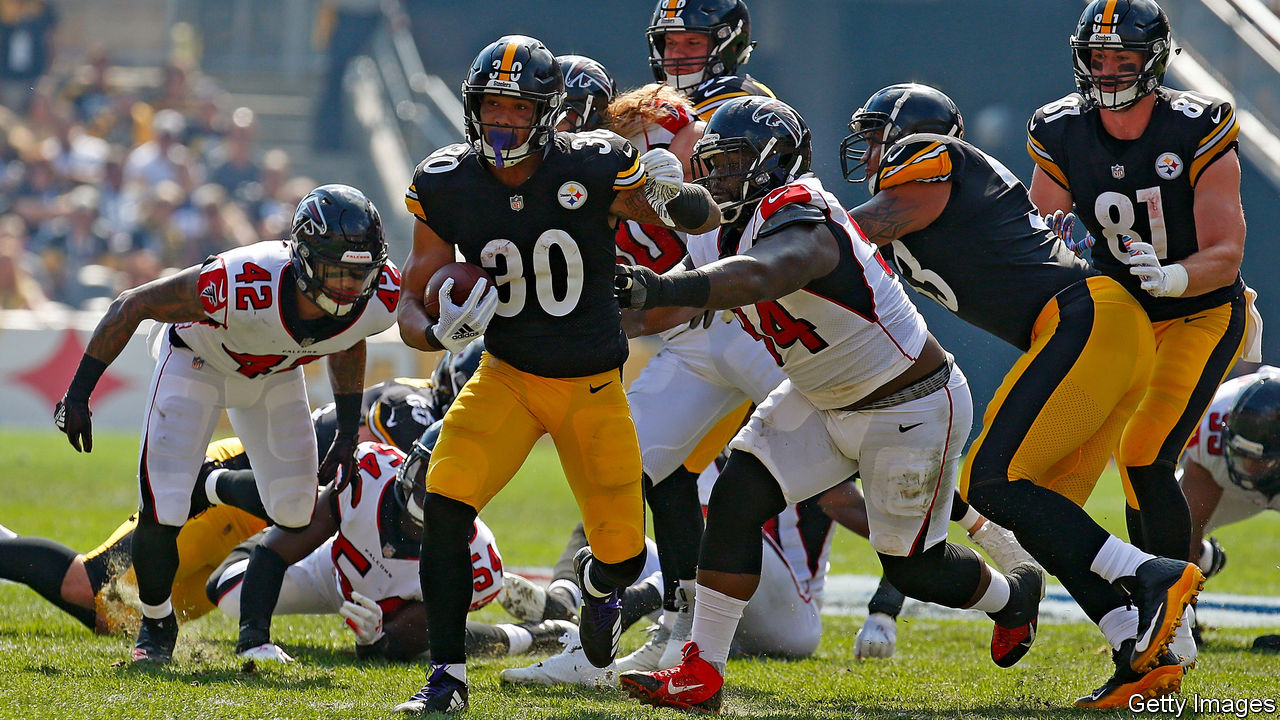
IN AMERICA the rules of the National Football League (NFL), the National Basketball Association (NBA), the National Hockey League (NHL) and Major League Baseball (MLB) all allow players to be traded without their consent to organisations on the other side of the country. At their new club they will usually retain the terms and length of their original deal. But of the four leagues, it is the NFL that gives players the least power and security over their contracts. Why?
Unlike those of the NBA, NHL and MLB, the vast majority of the NFL’s player contracts are not actually “guaranteed”. They confirm neither the identity of a player’s employer nor his money. The contract’s headline value is heavily dependent on the player’s fulfilling the terms of clauses relating to performance, or on the organisation deciding they want to keep him. NFL stars can be released from their contracts if they are injured or performing poorly, and their employers do not have to pay out the full value of the deals. For example, in 2010 Donovan McNabb signed a five-year contract extension with the Washington Redskins worth $78m. But it was reported that nothing beyond $3.5m in the first season was guaranteed. The Redskins had an option on whether to activate the remaining four years of the deal, but never did so. Mr McNabb was traded to the Minnesota Vikings in 2011 after underwhelming performances, and was released by Minnesota later that year, having received a fraction of the value of the deal he signed in 2010.
There is no legal reason why NFL deals should not be fully guaranteed. But team owners have little incentive to change a situation that works in their favour, as they would if they were to rewrite the current collective bargaining agreement (CBA), a labour agreement between players and owners. One reason why owners hesitate to guarantee money is that the CBA requires teams to put any guaranteed money in escrow at the time of a contract’s signing, even if it is not due to be paid for years. Another is the NFL’s salary cap. Russell Okung, who plays for the Los Angeles Chargers, argued in July that owners hesitate to guarantee money because of the way portions of a team’s salary cap can be locked up in “dead money”. This is money guaranteed to a player when a contract is signed, which counts as part of the team’s salary payments for the whole of the deal, even if that player has been released. “Dead money” hurts a team’s ability to spend in future. The majority of player incomes are therefore only guaranteed from one year to the next—a particular worry in a game with a high risk of injury. A paper published under Harvard University’s Football Players Health Study estimated that, on average, NFL games see five times as many injuries as the sum of injuries in the other three leagues.
The current CBA expires in 2021, and renegotiation will be a battle between the interests of players and owners. Todd Gurley, a running-back for the Los Angeles Rams, said that players may have to strike to advance their cause. Le’Veon Bell’s decision to sit out games for the Pittsburgh Steelers this season, in hopes of obtaining more guaranteed money in a contract extension, looks a harbinger of labour conflicts to come. There have been some positive signs for players. Kirk Cousins recently signed a three-year, fully guaranteed deal worth $84m with the Minnesota Vikings—the first deal of its kind. But such a contract is an anomaly reserved for the game’s top few, and owners still have little incentive to change the structure. For the vast majority of those who play in the NFL, contract security will remain a rarity.
Be the first to comment